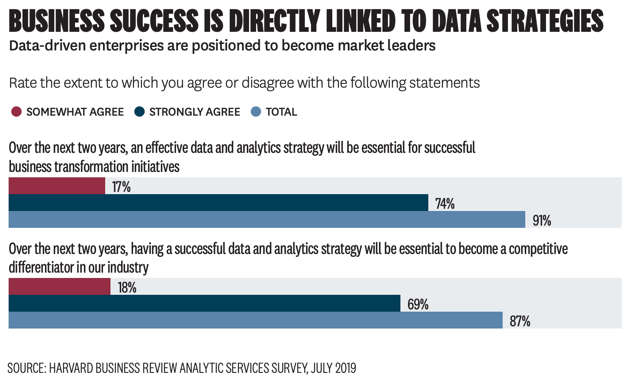
I started to write this story last weekend, and low and behold; a significant acquisition took place this week. RE/MAX purchased a data-driven PropTech firm with a beautiful product — First.io.
Building an organizational culture around data is not easy. Today’s market and the future have made it a necessity to leverage data to survive. So, it is not surprising that RE/MAX has taken steps towards acquiring a which has culture rooted in data-driven decision making. As we have found out over the last few years, it is more convenient to buy intellectual property than to build from scratch organically.
The good news? There are opportunities to create a culture around data for any size and type of business.
Why is data-driven culture important?
Reasons for connecting a digital transformation around the culture of data are many.
Let’s explore how a data-driven culture impacts real estate in improving the customer experience, achieving higher productivity and output, and surviving in an environment of big changes.
The Customer Experience
Not a day goes by where we don’t discuss the significance of improving customer experience. A data-driven culture exposes those insights and decision making possibilities to provide a better customer experience.
A Harvard Business Review Analytic Services survey of 469 global companies illustrates this benefit. The study found 62% of executives from mature data-driven companies can correlate data insights to better customer service.
This study also reveals the necessity of having a data-driven strategy in place over the next two years. Over 87% of the executives agreed or strongly agreed, that a data and analytics strategy is a differentiator in the marketplace.

Improved Organizational Productivity and Output
An MIT research study on the impact of a data-driven decision-making (DDD) culture was published in 2011 by professor Erik Brynjolfsson and his colleagues. They deduced from their research:
“of 179 large publicly traded firms, we find that firms that adopt DDD have output and productivity that is 5-6% higher than what would be expected given their other investments and information technology usage.”
As an example, data-driven decisions in a brokerage could mean significant gains in outputs such as units sold, mortgage opportunities, lead generation, or marketing expenditures. It also means increases in productivity in a brokerage’s agent service offerings. A tremendous value-add proposition for agent recruiting and retention.
Intuition or data or both
Executives that I’ve encountered in brokerages, MLSs, and PropTech companies employ a lot of their intuition or ‘gut feelings’ in making crucial strategic or action-based decisions.
While intuition is a decision-making tool based on experience and knowledge, there is an element of cognitive bias that influences our intuition.
A data-driven culture democratizes data across the organization and eliminates the guesswork out of the equation. It also minimizes any prejudices and illusory truth effect involved in the decision-making process.
Future-proofing the business
Enterprise organizations the value of a data-driven culture over four years ago. Cambridge Service Alliance of the University of Cambridge published a paper on Data and Analytics – Data-Driven Business Models: A Blueprint for Innovation. Their research concluded that “businesses with aspirations of growth or long-term survival that it should no longer be a question of whether they should become data-driven but rather how and when.”
Future-proofing is what a majority of these businesses are striving to accomplish in today’s market. They have energized their organization into a digital transformation of their culture around data.
Examine how a data-driven culture could provide insights based on the following questions.
Marketing question:
What part of our social media strategy is having an impact on customer inquiries on listings? Is it positive or negative, and should we do more or less based on current market activity?
Technology question:
What support issues are prevalent, and how much time does it take to resolve these issues? Is there a correlation between these issues and time to resolve with agent satisfaction?
Training question:
If we continue to offer face-to-face agent training, which offices need more training and with what tool? What impact can we expect this new training can have on office sales?
Sales Manager question:
How are your agents performing in comparison to the markets they serve? Is it positive or negative? What areas can we assist an agent to improve their business in this market?
Data-driven culture for all.
While each organization is different, the transformation into a data-driven culture is a customized process. It is a process that does scale to the size of the business. There are tools and methods available to make any company think and act data. Be that ‘change agent’ and differentiate your organization from the competition.
“Think data, act data”
In our next article, we answer what characteristics and values make a data-driven culture. In the meantime, call Victor, Marilyn or David to discuss how a data-driven culture can transform your company.





How about using data-driven culture within a real estate team?
Too small?
Thank you,
Sandy Baker
Associate Broker
THE BAKE GROUP
Hi Sandy:
Great question! Nurturing a data-driven culture is possible for teams. In my next article, I explore a few significant characteristics of a data-driven culture. If a team can engage in developing these characteristics, their decision-making process becomes inspired by a data mindset.
What I see as challenging for teams is having access to data and technical competency to aggregate the data and generate reports to use for analysis and making decisions. I do believe this is where Brokers and MLSs eventually will play a role in supporting teams.
It only makes sense. Real Estate Teams have many of the same questions and business decisions as Brokers and MLSs. They also have many different types, as well.
The expectation is to support Teams and Agents with the tools to allow them to make better decisions about their business. It is my opinion this support only strengthens the delivery of a better consumer experience and increases growth of the business.
If you have additional questions, please reach out to me. I would love to discuss this in detail and what your thoughts are about your business. David